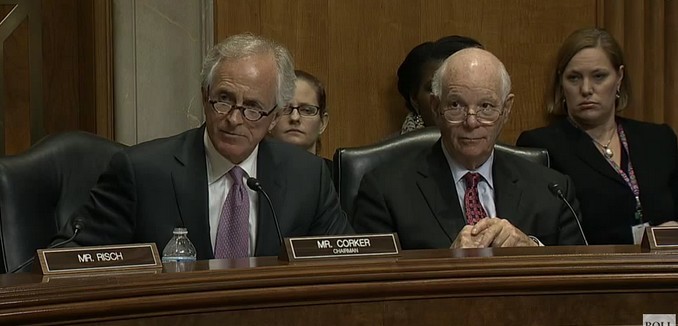A bipartisan bill targeting Iran’s escalating “rogue behavior,” including its continued ballistic missile program, its support of terror, its shipment of conventional weapons and human rights abuses, passed the Senate Foreign Relations Committee Wednesday by an overwhelming 18-3 vote, and now heads to the full Senate.
The Countering Iran’s Destabilizing Activities Act of 2017, which was introduced by Committee Chairman Sen. Bob Corker (R – Tenn.) in March, now has 48 co-sponsors.
Following passage of the bill in committee, Corker called it a “first step in finally holding Iran accountable for their non-nuclear destabilizing activities.” He added, “Iran’s rogue behavior has only escalated since implementation of the agreement,and this bipartisan bill approved by the committee today will give the Trump administration additional tools for holding Tehran accountable. It also sends an important signal that the U.S. will no longer look the other way in the face of continued Iranian aggression. I am proud of the strong bipartisan momentum behind this effort and will push for timely consideration on the Senate floor.”
“Today’s committee approval of this bipartisan legislation brings us one step closer to finally ensuring Iran’s leaders understand they do not enjoy blanket impunity as the United States continues to live up to its commitments under the JCPOA,” said Sen. Bob Menendez (D – N.J.).
“As the Administration continues to review its Iran policy, Congress must set out clear markers that impose real consequences to Iran’s illicit behavior that runs counter to our national security and that of our allies in the region. I will work diligently with my colleagues so this important legislation is swiftly taken up by the full Congress and sent to the President’s desk for his signature,” he added.
Just hours bfor #SFRC passing bill to impose new sanx on Iran, IRGC announced that been developing 3rd underground ballistic missile factory https://t.co/4PrhUFptLW
— Hadi Nili (@HadiNili) May 25, 2017
“Advancing this bipartisan bill sends a clear message to Iran that our nation will work to counter its aggression in the places like Syria and Yemen, its support for terrorist groups like Hezbollah, its development of ballistic missile technology, and its serial violations of human rights,” said Sen. Bob Casey (D – Penn.), who supported the nuclear deal two years ago.
“Iran is contributing to regional instability and has not demonstrated any interest in rejoining the community of responsible nations by halting its malign behavior. Today’s bipartisan Committee passage of Iran legislation underscores Congress’ role in articulating a roadmap for pushing back on Iran’s aggressive actions,” said Sen Ben Cardin (D – Md.) the Ranking Member on the committee.
A statement from the committee listed three key provisions of the bipartisan legislation:
New Mandatory Ballistic Missile Sanctions: Imposes mandatory sanctions on persons involved with Iran’s ballistic missile program and those that transact with them.
New Terrorism Sanctions: Applies terrorism sanctions to the Islamic Revolutionary Guard Corps (IRGC) and codifies individuals who are currently sanctioned due to Iranian support for terrorism.
Enforcement of Arms Embargo: Requires the president to block the property of any person or entity involved in specific activities related to the supply, sale, or transfer of prohibited arms and related material to or from Iran.
Kerry yesterday tells SFRC not to pass new Iran sanctions bill. SFRC today passes new Iran sanctions bill by a vote of 18-3. https://t.co/rGzmbDA7Zx
— Mark Dubowitz (@mdubowitz) May 25, 2017
Last week Jenna Lifhits of The Weekly Standard reported that former members of the Obama administration, including former Secretary of State John Kerry, were mobilizing to block the passage of new non-nuclear sanctions against Iran.
At a Senate hearing in July 2015, Kerry was emphatic that Iran was in agreement that within the framework of the nuclear deal, the United States could impose and maintain non-nuclear sanctions against Iran.
But they are clear and we are clear that we have all other kinds of authorities and let me specific on that because it’s important for this whole debate to be clear. Even with the lifting of sanctions after eight years on missiles or five year on arms are the UN sanctions. It’s only the UN sanctions. We still have sanctions. Our primary embargo is still in place. We are still sanctioning them. And, I might add, for those things that we may want to deal with because of their behavior, for instance, Hezbollah, there is a UN resolution, 1701, the prevents the transfer of any weapons to Hezbollah. That will continue and what we need to do is make sure that we’re enforcing it.
[Photo: Roll Call / YouTube ]




